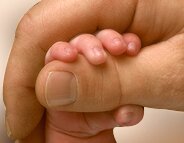

 |
||
|
Ovum Donor Program: Overview for Recipients and Donors The UCSF Ovum Donor Program, which began in 1991, was one of the first programs of its kind in the Bay Area. The main objective of the UCSF program is to provide women an opportunity to achieve a pregnancy that would otherwise be impossible. Here is more detailed information:
For Recipients The UCSF Ovum Donor Program, which began in 1991, was one of the first programs of its kind in the Bay Area. The main objective of the UCSF program is to provide women an opportunity to achieve a pregnancy that would otherwise be impossible. Oocyte (egg) donation allows women, whose ovaries do not contain eggs or contain eggs that are unlikely to result in healthy, successful embryos, to become pregnant. Using an ovum donor may be appropriate for women who were born without ovaries; whose ovaries have been removed due to endometriosis or tumors; whose ovaries may have been damaged by radiation or chemotherapy; or whose ovaries are now producing eggs with decreased viability due to advanced maternal age, premature menopause, or chromosomal abnormalities. An increasing number of women are choosing ovum donor programs when other traditional infertility therapies, including in vitro fertilization, have been unsuccessful or when hormonal tests indicate very poor reproductive potential. A woman serving as the ovum donor undergoes stimulation of her ovaries with medication to try to produce several eggs. The eggs are then removed from her ovaries through the vagina using ultrasound. These eggs are fertilized in the laboratory with the sperm from the partner of the ovum recipient. The fertilized eggs are placed through the vagina into the uterus of the recipient (who has been on a medication regime to help prepare the lining of the uterus to receive embryos) two to three days later. We often recommend transferring two embryos because success rates with two-embryo transfers is high and we have had several triplet pregnancies when three embryos have been transferred. When deciding if ovum donation is an acceptable alternative to help a couple become parents, there are several things to consider. Often there are emotional, psychological and sometimes legal issues that need to be resolved before ovum donation is decided upon. UCSF's program works with several professional counselors who are experienced in helping couples make this decision. After deciding to pursue egg donation, the next major decision is choosing an egg donor. A couple may choose to have either an anonymous donor (usually 21-33 years of age) or someone they designate. Sisters and close friends often become excellent egg donors. If a couple chooses to use a designated donor (someone known to them), we require that she have a separate consultation visit with us and will arrange some screening tests at that time. Recipients are welcome to come along for that visit, but we will meet with the donor privately for some part of the consultation. We will also make arrangements for the donor, the recipient, and the recipient's partner to participate in counseling to gain insight and support throughout the process. Donors can also be identified through an outside ovum donor recruitment agency. The agency coordinates some of the screening and then works with our program at the appropriate time. All donors are screened for any family history of birth defects or hereditary diseases. They also undergo a medical and social history, physical examination, psychological screening and laboratory screening. The recruited donor relationship can be completely anonymous, or the donor may be interviewed, or the recipient may even accompany the donor through the entire in vitro fertilization process. If you are interested in more information about the UCSF Ovum Donor Program, contact us at . We will discuss the program with you and can set up an initial consultation with a member of our medical team. During this first appointment, the procedure will be discussed in detail. After taking your history, the physician can then best advise you whether egg donation is a viable option for you. |
||